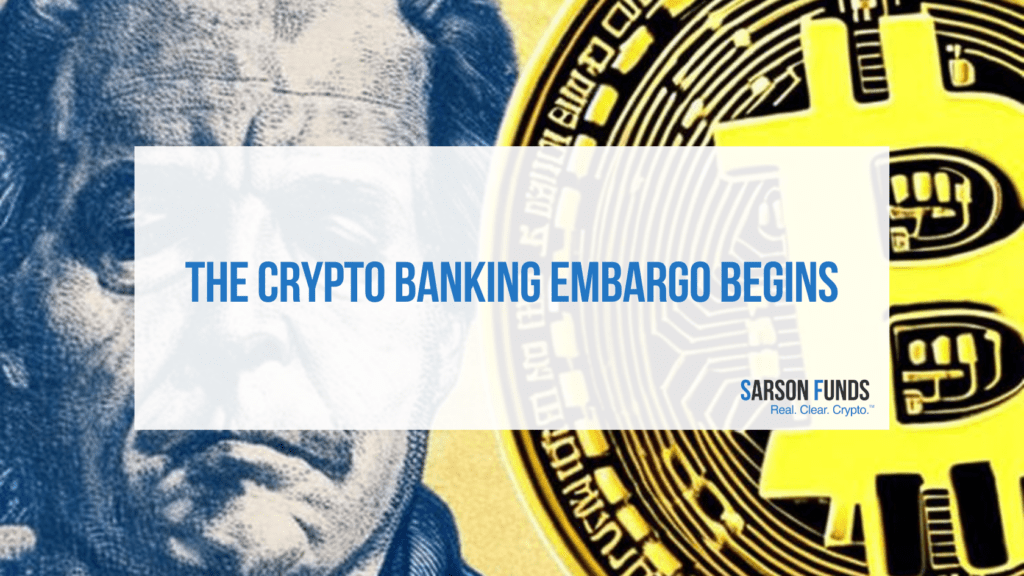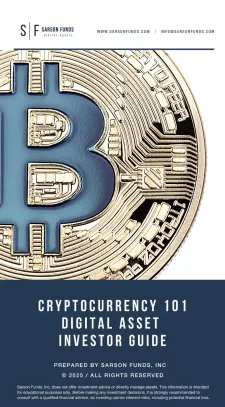
Despite enjoying the generally rising prices for cryptocurrencies since the collapse of Silvergate Bank, Silicon Valley Bank and Signature Bank, all is not well in Crypto Land.
Last week’s FDIC’s seizure of Signature Bank was the moment when, in our opinion, what started as a bank run on Silvergate Bank, became a coordinated attempt by the FDIC to deny crypto-related firms access to US banking.
According to the FDIC’s statement at the time, Signature Bank was seized due to the “Systemic Risk” it presented to the banking system. At Sarson Funds, we are asking, did Signature Bank really present a systemic risk, or, as former congressman and Banking committee chair Barney Frank suggested, did Signature Bank “get taken down because of its association with the crypto industry”?
Signature Bank Collapse
At the start of 2023, Signature had $110 billion in assets, ranking 29th largest among U.S. banks. This positioned Signature Bank far below the $250 billion in size that regulators had previously suggested in the 2018 update of the Dodd-Frank act that would be necessary for a bank to be large enough to be able to present “Systemic Risk”. And that assumes the bank was under some type of duress, which did not seem to be the case. In January, Signature Bank had $88 billion in deposits, suggesting positive equity of $22 billion. At that time, approximately 5% of deposits ($5.5 billion) were from firms doing business in digital assets (such as Coinbase and Circle, both clients).
In its most recent mid-quarter update (since removed from its website but still available here), Signature showed deposit balances through February were just $826 million lower. The bank said the decrease was “driven by the deliberate decline in digital asset client-related deposits of $1.51 billion.” Excluding digital asset related deposits, Signature’s deposits increased by $682 million for the same period. In summary, the bank had reduced its crypto deposits to $4 billion and saw positive deposits in other parts of its healthy and diversified business.
After reviewing the mid-quarter report, and one day after the failure of Silvergate Bank put all crypto-friendly banks under the microscope, JP Morgan, a competitor of Signature Bank and a “too big to fail bank” who would have little incentive to whitewash any problems at Signature Bank, reiterated its analyst’s Buy rating on Signature’s stock. In the note JP Morgan reiterated an Overweight rating on Signature shares, writing: “On an overall basis, the mid-quarter update provided by Signature ‘threads the needle’ as the company continues to reduce exposure to digital asset related deposits…” Others agreed, including Wells Fargo on March 9th. Those with intimate knowledge of the bank, including famed banking regulation architect and current board member, Barney Frank, said he saw no insolvency issues at the bank. He told CNBC, Politico and other news organizations that he believed regulators shuttered Signature due to its servicing crypto clients.
This claim was refuted by the New York Department of Financial Services the next day March 14th, (the speed of the official denial should have immediately raised suspicions) who said the bank closure was not due to its role with crypto companies, but instead because, “The bank failed to provide reliable and consistent data, creating a significant crisis of confidence in the bank’s leadership…”.
FDIC Response
This represented a pivot from what the public was told by the FDIC, that the bank had presented Systemic Risk. And no issues with crypto? This wasn’t what the banking industry was hearing. Reuters reported on Wednesday March 14th, citing two sources close to the matter, that as the FDIC shopped for a buyer of Signature Banks assets the FDIC was requiring the purchaser to divest any of crypto-related deposits.
On Thursday, March 16th the FDIC responded to this report saying that “the agency would not require divestment of crypto activities as part of any sale”. But… that is exactly what happened yesterday when the FDIC announced that effective Monday, Signature Bank depositors — other than depositors related to the digital banking business — will automatically become depositors of new bank, Flagstar.
According to the statement, the takeover will “not include approximately $4 billion of deposits related to the former Signature Bank’s digital-assets banking business. The FDIC will provide these deposits directly to customers whose accounts are associated with the digital-asset banking businesses.” (emphasis added)
Essentially, the FDIC is cashing crypto companies out of banking. And they are doing so without advice as to where they should go. For most customers of Signature Bank, it is business as usual this Monday. But for those “digital-asset” related companies the exact opposite is true. They must call a number and get in line for FDIC processing and the (hopeful) return of assets.
With this action, it appears that the FDIC has revealed their true motivation behind the seizure of Signature Bank and that, at the expense of Signature Bank’s employees, shareholders and law-abiding, regulation-following businesses, a crypto banking embargo in the United States has begun.
Does this affect Sarson Funds?
So how does that affect us at Sarson Funds? Well for starters, it’s important to point out that we aren’t in the category of crypto clients that the FDIC is the most concerned about. We do not launch digital products or tokens; we are not a cryptocurrency exchange or a firm that offers staking or deposit services for unknown customers. We offer Limited Partnerships, comprised solely of fully documented US-based Accredited Investors. We don’t do business with the mass retail market and certainly do not work for any anonymous clients.
These are important differences. This is how we comply with the current regulations that we have as a US-regulated manager of a private pool of capital. At Sarson Funds and its associated managers, all portfolios are offered under the long established “exempt security offering” framework known as Regulation D. (This is why you may hear us say that we only offer investments to Accredited Investors and through regulated structures, this is a reference to the Regulation D security offering structure.) It’s also the reason for our lengthy applications and regular requests to refresh and reverify your personal information. We don’t make the rules, we just follow them. And we know that in this environment of heightened scrutiny we must be perfect in our compliance, and we are. Our compliance and operation team and partners leave nothing to chance.
That’s not to say that the current regulatory backdrop is not negatively impacting our operations at Sarson Funds and other firms in our category. It is. We are spending expending enormous amounts of time and energy trying to create new solutions and future redundancies in our banking to ensure that client deposits and withdrawals can happen without delay.
We are ahead of many of our competitors with our attention to banking challenges. We have excellent contacts in traditional banking given our traditional banking roots. There are still many banks that will take cryptocurrency companies -since it is not illegal to bank crypto companies — but switching from one bank to another as we’re being forced to do is time consuming. The level of due diligence performed by banks accepting new crypto clients is very detailed.
On the investment front, things are much better. Partnership capital does not sit in the bank account, it is already invested in crypto assets and the funds are enjoying the boost that banking stresses have offered the prices of many tokens. We thought it quite an easy trade to buy USDC in two of our strategies this month when it briefly traded at $0.89 following the uncertainty around Silvergate’s collapse. When the leading US stablecoin recovered back to $1.00, we closed that trade at a nice profit just 48 hours later.
We look forward to sharing a more detailed performance update with you soon but rest assured that our funds are nearly fully invested in crypto assets, and we are performing positively and very much in line with the performance you are seeing on flagship assets Bitcoin and Ethereum.
That’s what’s going on right now in the crypto industry and with our portfolios. We are always here to get on the phone or answer any questions you may have. Our goal for the summer is to get all our Limited Partners set up with their own digital wallet, so that should the banking system face further stresses you each have digital assets that you can instantly and safely access to take advantage of any investment opportunities that may arise out of such events.
Disclosures: Not investment advice. It should be assumed that Sarson Funds or its affiliated managers hold positions in all projects that are discussed. It is not possible to invest in any project directly through Sarson Funds, Inc. or its affiliated managers. Any investment product offered by managers affiliated with Sarson Funds should be assumed to be only available to Accredited Investors and subject to the individual terms and conditions of that offering including but not limited to those eligibility requirements associated with U.S. Securities Regulation D, section 506c. Talk with your financial advisor before making any investment decisions or have them contact Sarson Funds directly at [email protected]








